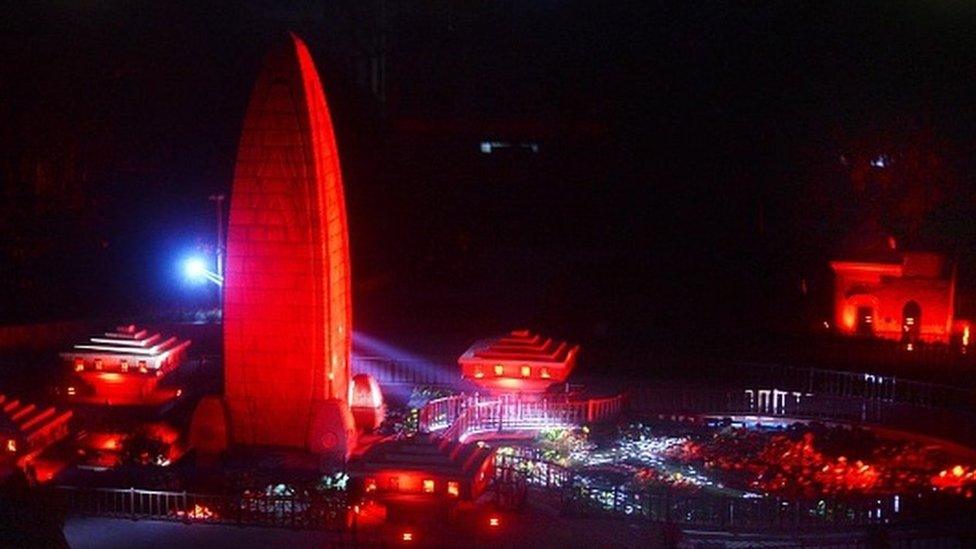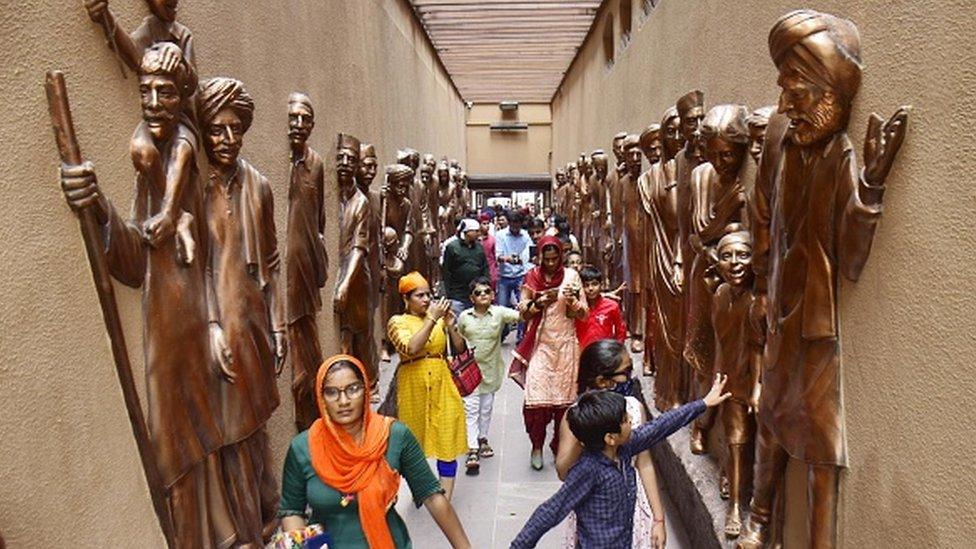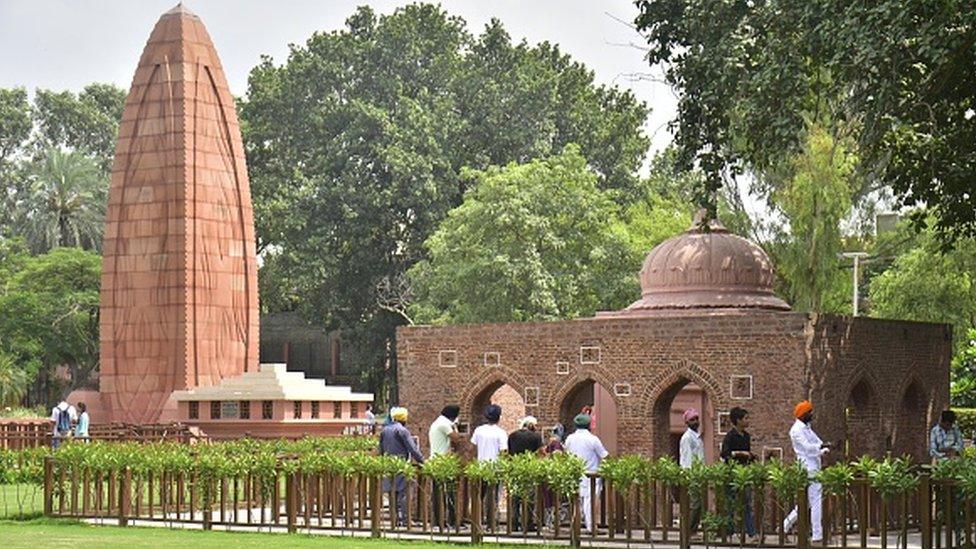Jallianwala Bagh: Indian outrage over revamp of memorial
- Published

The Indian government has started a daily sound and light show at Jallianwala Bagh
Indians are outraged over the revamp of a memorial park that was the scene of one of the bloodiest massacres in British history.
Prime Minister Narendra Modi inaugurated the renovated Jallianwala Bagh complex in the northern city of Amritsar on Saturday.
Hundreds of Indians were shot by British troops while attending a public meeting at the site in 1919.
The massacre was a turning point in India's nationalist movement.
The grounds of Jallianwala Bagh - with its stone monument, porticos and pathways - have since served as a sombre reminder of India's painful past, and have attracted tourists from across the world.
The government has now given the site a facelift - museum galleries have been opened and a daily sound and light show has been started to display the events of 13 April, 1919.
The walls of a narrow lane - through which British soldiers led by Brigadier General RH Dyer entered the park - have been embellished with murals and sculptures, to commemorate those who died on that fateful day.

The walls of the memorial have been adorned with murals
And the Martyrs' Well - in which many people are believed to have jumped to escape the bullets - has been covered with a transparent barrier.
Mr Modi said the renovated Jallianwala Bagh "will remind the new generation about the history of this holy place and will inspire to learn a lot about its past".
But critics called the move insensitive, and accused the government of trying to erase and distort the country's history.
Historian Kim Wagner called it a "part of the general Disneyfication of the old city of Amritsar", adding that the revamping of the site "means that the last traces of the event have effectively been erased".
Allow X content?
This article contains content provided by X. We ask for your permission before anything is loaded, as they may be using cookies and other technologies. You may want to read X’s cookie policy, external and privacy policy, external before accepting. To view this content choose ‘accept and continue’.

Chaman Lal, a historian and professor at India's Jawaharlal Nehru University, said the project had tried to "mystify and glamourise history".
"People visiting Jallianwala Bagh, external should go with a sense of pain and anguish," he told The Hindu newspaper. "They have now tried to make it a space for enjoying, with a beautiful garden. It was not a beautiful garden."
Eminent historian S Irfan Habib called the project a "corporatisation of monuments," that has been done "at the cost of history, cost of heritage".
"It is absolutely gaudy...Why should there be murals on the wall?" he said.
Political opponents also criticised Mr Modi's government for the decision.
Main opposition leader Rahul Gandhi led the charge, saying his Congress party was against "this indecent cruelty".
"Such an insult to the martyrs of Jallianwala Bagh can only be done by those who do not know the meaning of martyrdom," Mr Gandhi tweeted. "I am the son of a martyr - I will not tolerate the insult of martyrs at any cost."
Mr Gandhi's father Rajiv Gandhi, a former prime minister, was assassinated in 1991, in what was seen as retaliation for Indian involvement in Sri Lanka's civil war, after peacekeepers were deployed there in 1987.
Priyanka Chaturvedi, a leader of the Shiv Sena party in Maharashtra state, said that by trying to "beautify or modify" a place that evokes painful memories for many, the government was "doing great damage" to India's collective history.
British MP Preet Kaur Gill tweeted: "Our history being erased. Why?"
Shwait Malik, an Indian MP belonging to the ruling BJP and a member of the Jallianwala Bagh Trust, defended the renovation.

Visitors at the memorial after it reopened on Saturday
"These sculptures in the lane will make visitors conscious of those who walked in on that day… Earlier, people walked this narrow lane without knowing its history, now they will walk with history," he said.
Indian nationalists protesting against heavy war taxes and the forced conscription of Indian soldiers had gathered at the site on the fateful day in 1919. Others were celebrating the city's Sikh Baisakhi festival and found themselves mixed up with the demonstrators.
British colonial authorities had earlier declared martial law in Amritsar and banned public meetings due to a rise in public demonstrations.
Without warning, Gen Dyer blocked the exits and ordered his troops to fire on the crowd. They stopped firing 10 minutes later when their ammunition ran out.
The death toll is disputed - an inquiry set up by the colonial authorities put the figure at 379 but Indian sources put it nearer to 1,000.

India marks 100 years since the Amritsar massacre
